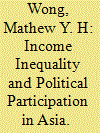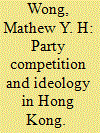| Srl | Item |
| 1 |
ID:
186404


|
|
|
|
|
| Summary/Abstract |
This paper examines the impact of income inequality on political participation in Asia. Both conventional conflict theory and relative power theory suggest that inequality affects political participation, but they predict opposite directions. In this paper, I argue that the effects of inequality on participation depend on the type of political action: radical or institutional. To substantiate this claim, I analyze four Asian Barometer Survey waves from 2001 to 2014. Using nested models, I find that the effect of income inequality is conditional: it is positively associated with violent activities; has no significant correlation with less radical forms of protest; and is negatively associated with institutional actions, namely voting and persuading others to vote. While the effect does not depend on income level, regime type matters for certain activities. Political capacity, the perception of powerlessness, and trust in government are other potential factors in the relationship.
|
|
|
|
|
|
|
|
|
|
|
|
|
|
|
|
| 2 |
ID:
174126


|
|
|
|
|
| Summary/Abstract |
This study provides a new dataset on the ideological positions of political parties in Hong Kong, which is a hybrid regime with electoral elements. Using this dataset, the study challenges the non-ideological view of party competition in Hong Kong by identifying an ideological dimension to the elections held between 1998 and 2016. It is shown that parties do position themselves along an identifiable left–right spectrum, with shifts that can be meaningfully interpreted, and that the aggregate ideology of the electorate appears to be linked to the level of economic growth. The ideological dimension provides a novel perspective on local politics that looks beyond the dominant pro-democracy versus pro-Beijing divide while also shedding light on the recent changes underlying the latter. This study provides valuable objective data for analyzing political competition dynamics and contributes to the comparative literature by incorporating Hong Kong into the framework of the manifesto coding project.
|
|
|
|
|
|
|
|
|
|
|
|
|
|
|
|